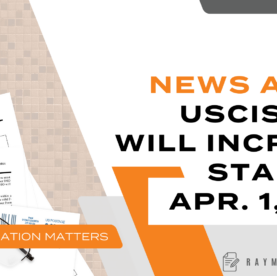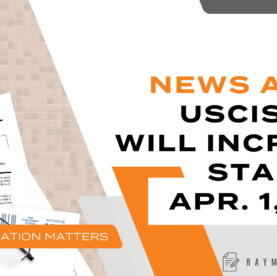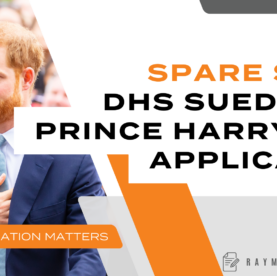5 Workplace Discrimination Examples Based on Immigration Status and National Origin

Last month, the New York City Commission on Human Rights (“NYCCHR”) adopted enforcement guidance on its prohibition of discrimination on the basis of actual or perceived “alienage and citizenship status” and “national origin.” The NYCCHR highlighted the following demographics of our city’s melting pot:
- Approximately 3.2 million residents (37% of the city’s population) were born outside of the country
- More than 50% of children in the city have a foreign-born parent
- Approximately 60% of residents in the city live with at least one immigrant in the household
- With hundreds of languages spoken throughout the five boroughs, New York is one of the most linguistically diverse cities in the world
Introduction
The New York City Human Rights Law (“NYCHRL”) states that it is unlawful to discriminate in the terms and conditions of employment because of a job applicant’s or employee’s actual or perceived immigration status or national origin.
The NYCHRL defines “alienage and citizenship status” as (a) the citizenship of any person, or (b) the immigration status of any person who is not a citizen or national of the United States. The Commission noted that because the term “alien” may carry negative connotations and dehumanize immigrants, the use of certain terms, i.e. “illegal alien” or “illegals,” with the intent to demean, humiliate, or offend a person constitutes discrimination under the NYCHRL. The Commission recognizes that it is often difficult to disentangle the motivation behind discriminatory animus based on immigration status, national origin, and other protected categories because this type of discrimination often overlaps discrimination on the basis of national origin, religion, ancestry, and/or ethnic characteristics. Therefore, the Commission allows individuals who feel they have experienced discrimination to file a complaint under any or all of the above categories.
Individuals interested in vindicating their rights under the NYCHRL can file a complaint with the Agency within one year of the alleged discriminatory act, or file a complaint in court within three years of the discriminatory act. Of import, after an employer has decided to extend an offer of employment, the individual enjoys the same protections under the NYCHRL as any other employee, regardless of his/her immigration status or work authorization. Undocumented immigrants can file claims of discrimination at the Commission and in court. Remedies include back pay, front pay, and emotional distress damages regardless of an employee’s immigration status.
Discrimination based on immigration status and national origin may occur in different ways.
1. Disparate Treatment
Disparate treatment occurs when an employer treats an individual less well than others because of his/her actual or perceived immigration status or national origin. Disparate treatment may be overt or subtle. It can also manifest through policies, treatment, harassment, and actions based on stereotypes or microinequities or assumptions. For example, disparate treatment based on actual or perceived immigration status or national origin may be expressed by animus based on one’s accent or use of another language.
2. Hiring Practices
Compliance with federal, state, or local laws that expressly permit inquiry into immigration status in certain circumstances is not discrimination. This includes employer verification of a job applicant’s work authorization upon hiring. However, employers should not knowingly hire or employ individuals without work authorization. In addition, federal law allows employers to prefer to hire a U.S. citizen or national over a noncitizen where two candidates are “equally qualified,” but only after fully considering the candidacy of all other applicants. Outside of this limited circumstance, discrimination against work-authorized individuals (citizens, permanent residents, refugees, asylees and those granted lawful temporary status) is a violation of the NYCHRL.
Employers should be careful to use consistent hiring practices and a dose of common sense! An employer should not ask an individual who has an accent whether he/she has work authorization if the employer does not ask the same question of someone who does not have an accent. Similarly, if an employer hires a worker who is not authorized to work in the U.S., this worker cannot be treated less well than other employees because of his/her immigration status, including his/her undocumented status.
3. Document Abuse
Employers must accept any document that qualifies under the I-9 “List of Acceptable Documents” as valid work authorization. In the same vein, employers must not request specific documents beyond what is required to establish valid work authorization (i.e. green card, birth certificate). Employers should not:
- ask to see work authorization documents before an individual accepts a job offer
- refuse to accept a document or hire an individual because a document will expire in the future
- demand a specific document when re-verifying that an employee is authorized to work
The above practices are referred to as “document abuse,” and when motivated by discriminatory animus, they are unlawful under the NYCHRL.
Re-verification of employment is authorized in the following limited circumstances under federal law: (1) the employee’s work authorization is expiring, (2) an employer develops “constructive knowledge” that the employee is not work-authorized, (3) the employer conducts a neutral, non-discriminatory self-audit of their compliance with work authorization requirements, or (4) during an I-9 audit by the federal government. Beyond these circumstances, reverification is not permitted. For example, reinstatement of an employee’s position; promotion; transfer; and strike are among the scenarios where reverification is not permitted.
Additionally, in the event an employer receives an “Employee Correction Request Notice” or a “No-Match Letter” from the Social Security Administration (“SSA”) office, employers should not assume that the named employee has an issue with their immigration status. Accordingly, adverse employment action, including but not limited to re-verification of the employee’s work authorization, is simply not warranted. The letter simply notifies employers that corrections are needed for the SSA to properly post its employee’s earnings to the correct record for the purposes of SSA benefits. To reiterate, receipt of a No-Match Letter is not a basis for taking adverse action against an employee or for re-verifying the employee’s work authorization.
4. Immigration Worksite Enforcement
This can occur in one of two ways: (1) a raid by the Immigration and Customs Enforcement Agency (“ICE”), in which the ICE Agents come unannounced to inspect files and/or detain workers whom they determine may be unlawfully present; or (2) an I-9 audit, in which ICE requires employers to submit their employment authorization records within three business days for verification.
Employers should give notice to their employees when they know or suspect that an audit or raid will occur so that employees know their rights and have an opportunity to update documents and make other preparations. It is not against the law for employers to provide notice to their employees of a worksite raid or audit unless explicitly prohibited, as in the case of an ongoing criminal investigation. Employers may potentially reduce the disruption of an unexpected raid by refusing ICE access to non-public facing areas if the agents do not produce a warrant signed by a judge.
It goes without saying that exploiting or threatening ICE involvement to further a discriminatory motive, to harass or intimidate employees, or to retaliate against employees for engaging in a protected activity is a violation of the NYCHRL.
5. Harassment
Harassment related to an individual’s actual or perceived immigration status or national origin is a form of discrimination and may consist of a single or isolated incident or a pattern of repeated acts or behavior. Disparate treatment may manifest as harassment when the incident or behavior of an individual fosters a culture or atmosphere that is demeaning or offensive. The severity or pervasiveness of the harassment is relevant only to damages. A single comment may be enough to constitute harassment.
As with other forms of harassment, employers are strictly liable for an unlawful discriminatory practice where the harasser exercises managerial or supervisory responsibility. Employers may be held liable for a non-managerial employee’s harassment if the employer either (1) knew about the employee’s conduct and “acquiesced in such conduct or failed to take immediate and appropriate corrective action,” or (2) should have known about the employee’s discriminatory conduct and “failed to exercise reasonable diligence to prevent such discriminatory conduct.”
Employers’ threats to call the federal immigration authorities can constitute unlawful harassment under the NYCHRL if motivated, in whole or in part, by animus related to the employee’s actual or perceived immigration status or national origin. Threats to call immigration authorities or the police to force employees to work in unsafe, unequal, or otherwise unlawful conditions is unlawful harassment. While reporting a violation of the law to the police is otherwise permitted, when such action is taken solely on the basis of a discriminatory or retaliatory motive, it is a violation of the NYCHRL.
Conclusion
Employers in New York City should review and update their equal employment opportunity and anti-discrimination policies, handbooks, and training programs to incorporate “discrimination on the basis of actual or perceived alienage and citizenship status and national origin” on the list of protected categories. In addition, Human Resources personnel and supervisory employees should be made aware that information related to an individual’s actual or perceived alienage and citizenship status and national origin should not affect employment decisions.
If you have any questions regarding this post or any other related matters, please feel free to email me at rsinha@norris-law.com.





